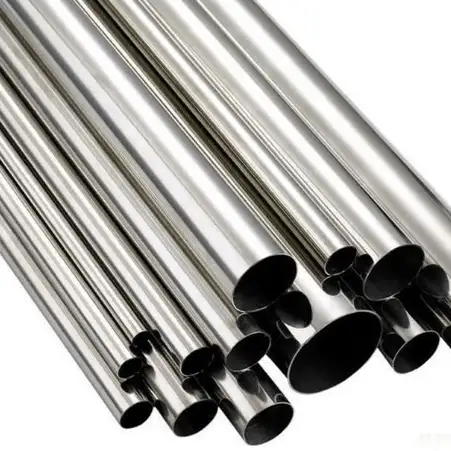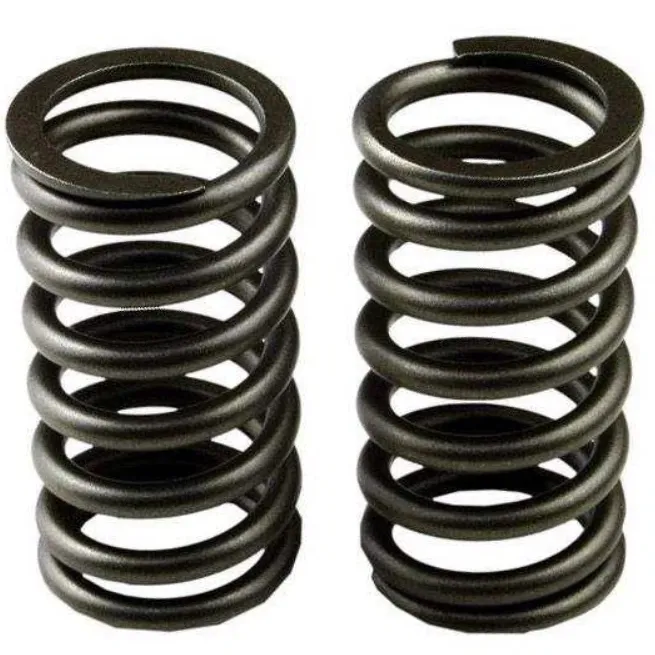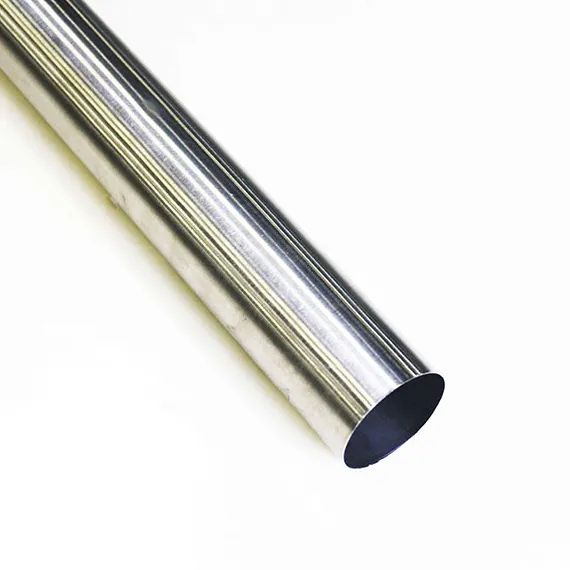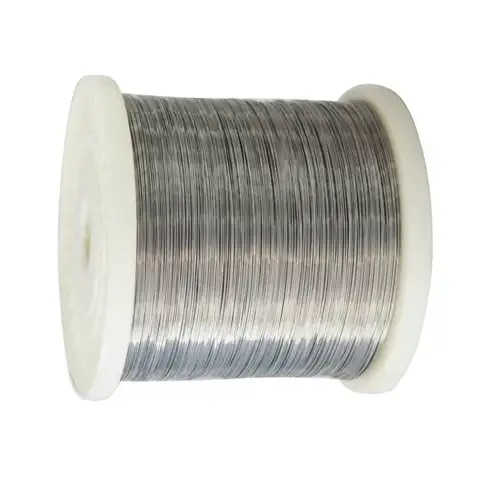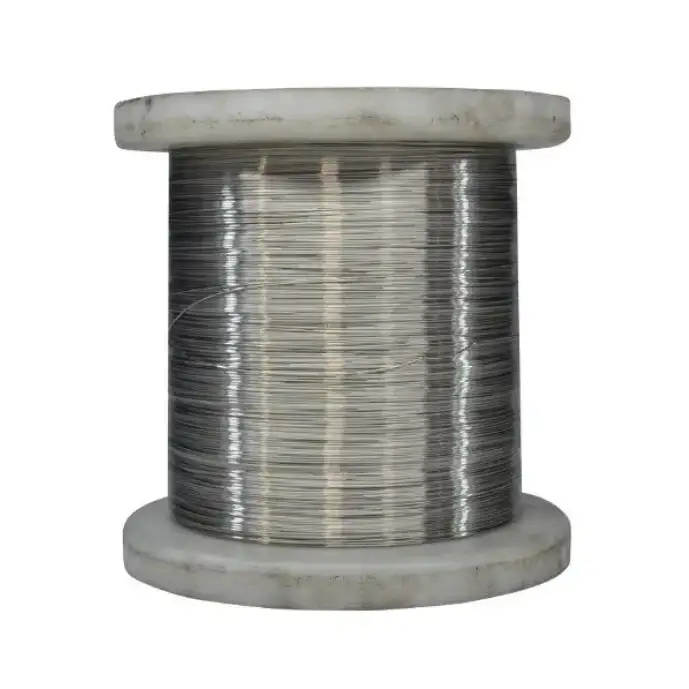Hastelloy C-276 pipe (UNS N10276, WNr 2.4819) is a premium nickel-molybdenum-chromium alloy pipe designed for the harshest chemical and chloride-containing environments. It combines exceptional resistance to pitting, crevice corrosion and stress-corrosion cracking with good weldability and stable mechanical behavior over a wide temperature range — making it the go-to choice when conventional stainless steels or lower-alloy nickel grades fail. MWAlloys stocks ASTM-grade C-276 pipe in a range of schedules and diameters, offers factory-direct pricing from China, and can support short lead-time shipments for urgent projects.
What is Hastelloy C-276 pipe?
Hastelloy C-276 is a wrought nickel-chromium-molybdenum-tungsten alloy created for resistance to both oxidizing and reducing chemical environments. In pipe form it is offered as seamless (ASTM B622 / ASME SB-622), welded (ASTM B619 / ASME SB-619) and in various schedules. The alloy is chosen when service contains chloride, chlorinated organics, strong oxidizers or sulfur-bearing species that would aggressively attack stainless steels and many other corrosion-resistant materials.
Chemical composition (typical ranges — UNS N10276)
| Element | Typical content (wt%) |
|---|---|
| Nickel (Ni) | Balance (~55–59 %) |
| Molybdenum (Mo) | 15.0 – 17.0 |
| Chromium (Cr) | 14.5 – 16.5 |
| Iron (Fe) | 4.0 – 7.0 |
| Tungsten (W) | 3.0 – 4.5 |
| Cobalt (Co) | ≤ 2.5 |
| Manganese (Mn) | ≤ 1.0 |
| Silicon (Si) | ≤ 0.08 |
| Vanadium (V) | ≤ 0.35 |
| Carbon (C) | ≤ 0.01 |
| Phosphorus (P) | ≤ 0.025 |
| Sulfur (S) | ≤ 0.01 |
Notes: values above are typical manufacturing ranges used by major producers and datasheets for HASTELLOY® C-276 (UNS N10276). Exact certified chemistry must come from mill test certificates (MTC) on each heat/lot.
Mechanical properties, hardness and typical performance
Representative mechanical properties (room temperature, annealed / solution-treated condition):
| Property | Typical value |
|---|---|
| Tensile strength (UTS) | ~690–790 MPa (100–115 ksi) |
| Yield strength (0.2% offset) | ~345–415 MPa (50–60 ksi) |
| Elongation (in 50 mm) | ~35–60% (depending on form) |
| Modulus of elasticity | ~200–210 GPa (~29–30×10^6 psi) |
| Density | ~8.9 g/cm³ |
| Typical hardness (Rockwell B) | ~82–95 HRB |
| Typical hardness (Rockwell C) | ~1–16 HRC (depends on work hardening / cold work). |
Hardness depends strongly on product form (tube, plate), cold work and any post-weld heat treatment. In standard pipe and tube supplied in solution-treated condition, expect Rockwell B values in the low-to-mid 80s; extensive cold work (e.g., forming) will increase hardness and strength.
What is C-276 pipe made of?
Hastelloy C-276 belongs to the family of solid-solution nickel alloys (austenitic, face-centered cubic). The high Ni content provides the austenitic matrix; Mo and W boost resistance to localized corrosion and sulfide-related pitting; Cr contributes oxidation resistance; low carbon and low silicon minimize carbide precipitation in weld heat-affected zones, which preserves corrosion resistance after welding. The alloy is not precipitation-hardening — strength changes primarily by cold work and alloy composition.
Microstructure in typical annealed material: a homogeneous austenitic matrix with uniformly distributed alloying elements. Grain boundary precipitation is minimized by the low C/Si specification, making the alloy tolerant of common welding procedures without special post-weld heat treatment for corrosion resistance.
What is Hastelloy C276 equivalent material?
There is no exact one-for-one replacement with identical performance, but common alternatives to consider:
-
Hastelloy C-22 (UNS N06022) — higher Cr and better oxidizer resistance; better for strong oxidizing acids.
-
Inconel 625 — similar corrosion resistance in many chloride environments but generally lower Mo/W content; often lower cost and higher strength.
-
Alloy 59 / N06059 — good chloride resistance but different balance.
-
Monel / Incoloy — sometimes used in less severe chloride conditions.
Selection depends on the specific chemistry, temperature and form of corrosion (general, pitting, crevice, SCC). For sour service (H₂S), check NACE MR0175 / ISO 15156 guidance and limit tables before substitute selection.
Standards and specifications
Common specs and codes used for C-276 pipe:
-
ASTM B622 / ASME SB-622 — Seamless nickel and nickel-cobalt alloy pipe and tube (includes UNS N10276).
-
ASTM B619 / ASME SB-619 — Welded nickel and nickel-cobalt alloy pipe and tube (welded product).
-
AWS filler/consumable designations for welding (use weld wire / filler recommended for Ni-Mo-Cr alloys).
-
NACE MR0175 / ISO 15156 — sour service limits; many C-276 datasheets and users reference compliance or compatibility tables for H₂S environments.
When placing orders include: UNS number (N10276), ASTM/ASME spec (B622 or B619), nominal size and schedule, end finish (plain/ bevel), heat treatment condition (solution annealed), negative tolerances, MTC (EN 10204 3.1 or 3.2), NDE requirements (hydrostatic / UT / PMI), and traceability.
Typical pipe specifications, sizes and weight guidance
Hastelloy C-276 pipe is offered in standard nominal pipe sizes (NPS/OD) and schedules (5S, 10S, 40S, 80S, XXS, STD) up to large diameters depending on mill capability.
Typical supply forms
-
Seamless pipe (ASTM B622) — common for high-integrity systems.
-
Welded ERW or EFW pipe (ASTM B619) — used where size or cost favor welded production.
-
Tubing for heat exchangers (ASTM B626/B626M or B836 variants).
Weight calculation (theory)
Weight per foot (lbs/ft) ≈ (OD − wall) × wall × 10.68 (for steel types). For nickel alloys use density factor (C-276 density ≈ 8.9 g/cm³) to compute exact weight; reference weight charts are supplied by mill or pipe tables. See technical weight charts used by pipe producers for exact schedule weights.
Global price snapshot 2025
Market prices for nickel-based alloys fluctuate with raw-material markets (nickel, molybdenum, tungsten), order quantity, form (pipe vs plate vs bar), schedule and global steel/aluminum market movements. Below are indicative ranges observed in supplier quotes and market reports in 2025; use only for budgeting and always request firm quotes and MTC-backed pricing.
Global indicative price table — 2025 (FOB / EXW per kg, rough ranges)
| Region / Market channel | Indicative 2025 range (USD/kg) | Typical remarks |
|---|---|---|
| China (factory / small orders) | $60 – $110 / kg | competitive mill lots, FOB Shanghai; depends on diameter & schedule. |
| India suppliers / stockists | $70 – $120 / kg | lead times vary; frequent export to Middle East. |
| Europe (stockists / distributors) | $95 – $150 / kg | higher logistics and distribution margins. |
| USA (distributors) | $100 – $160 / kg | availability can be constrained, premiums added. |
| Mill/large fabrication contract (bulk) | $55 – $95 / kg | negotiated pricing for multi-ton orders. |
Why ranges are wide: product form (seamless vs welded), wall thickness, quantities, testing, certification and global LME/Nymex movements for key elements. Recent 2025 transactional samples show C-276 pipe quotes spanning roughly $110–135/kg in some retail price snapshots, while Chinese factory offers (FOB) sometimes show lower banding depending on batch and stock. Always confirm current quotes and lead time.
What is the difference between Inconel and hastelloy C276?
-
Chemistry: C-276 has higher Mo and W content relative to many Inconel grades (e.g., Inconel 600/625 family differences) which boosts pitting and crevice resistance. Inconel 625 is Ni-Cr-Mo with high Nb and lower W.
-
Localized corrosion: C-276 usually performs better in mixed reducing/oxidizing chloride environments and in contaminated acids. Inconel 625 is excellent for many chloride environments and often stronger (mechanically) at elevated temperatures, sometimes at lower cost.
-
Weldability: Both alloys weld well, but C-276’s low carbon and silicon were developed to maintain corrosion resistance in the weld HAZ.
-
Cost: C-276 commonly carries a premium over Inconel 625 because of higher Mo/W levels and sometimes smaller production volumes.
Fabrication, welding and NDE notes
-
Welding: Standard nickel alloy fillers specified for Ni-Mo-Cr alloys should be used; preheat typically not required. Maintain proper welding procedures and consider post-weld solution anneal only when required by design codes.
-
Forming: C-276 is formable by usual hot/cold processes but will work-harden; large deformations may need intermediate solution annealing. Typical hot forming window: ~950–1,230 °C.
-
NDE & testing: Hydrostatic testing, PMI (positive material identification), chemical analysis and mechanical testing per the relevant ASTM standard should be requested. For sour service, metallurgical validation per NACE MR0175/ISO 15156 is advised.
FAQs
-
What is the hardness of Hastelloy C-276 pipe?
In the annealed solution-treated condition typical Rockwell B is ~82–95 HRB; Rockwell C values are low (1–16 HRC) unless the product is heavily cold worked. Test and MTC data are the final authority. -
What does C-276 pipe resist that stainless steels do not?
C-276 resists pitting, crevice corrosion and stress-corrosion cracking in mixed chloride and oxidizing/reducing environments that would attack 316/317L and even duplex stainless grades. -
What ASTM spec covers seamless C-276 pipe?
ASTM B622 (ASME SB-622) covers seamless nickel and nickel-cobalt alloy pipe and includes UNS N10276. -
Is Hastelloy C-276 suitable for H₂S (sour) service?
C-276 is often acceptable, but compliance must be verified against NACE MR0175/ISO 15156 environmental limits and specific metallurgical requirements. -
Can C-276 be welded without damaging corrosion resistance?
Yes — the alloy was designed with low C/Si to minimize harmful precipitates in weld HAZ; proper filler and procedure control still matter. -
What is the density and how do I calculate pipe weight?
Density ≈ 8.9 g/cm³. Use standard weight formulas or mill weight tables adjusted for actual OD/wall to compute mass per unit length. -
Are there cheaper substitutes for C-276?
Inconel 625 or some duplex stainless steels may be candidates in less severe environments; in critical chloride/oxidizer mixes, substitution risks premature failure. -
What certifications are typical?
Mill Test Certificate (EN 10204 3.1/3.2), PMI reports, hydrostatic/UT tests, welding procedure specs, and compliance statements for NACE (when requested). -
Typical lead time from MWAlloys / China stock?
For stocked items MWAlloys offers fast delivery (days to a couple of weeks). For mill/manufactured lots, typical 2–6 weeks depending on size and test scope (confirm at RFQ). -
How do I ensure I’m buying authentic Hastelloy (trademarked product)?
Request UNS number (N10276), full MTC, hardness & chemical analysis, traceability to a recognized mill, and PMI on receipt. Trademarked brand names (HASTELLOY®) are owned by makers — traceability is key.
MWAlloys - how we support buyers
MWAlloys is a China-based specialist in high-performance nickel alloys and stainless products. For Hastelloy C-276 pipe we offer:
-
Factory-direct pricing (100% factory price advantage) — we source directly from mills and large stockists.
-
Stock & fast shipment — maintained stock for common sizes; emergency shipments available for urgent projects.
-
Full documentation — MTC 3.1/3.2, PMI, hydrotest reports and NDE per buyer requirements.
-
Custom services — cutting to length, beveling, special packaging, and support for project-level inspection (third-party inspection available).
Contact MWAlloys for firm quotations, lead-time commitments and sample certificates.

